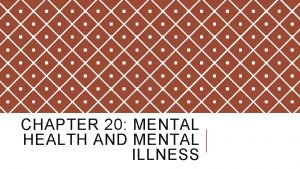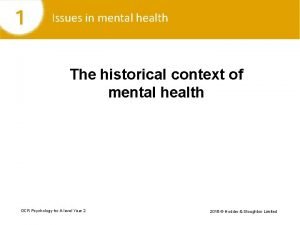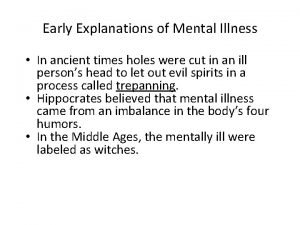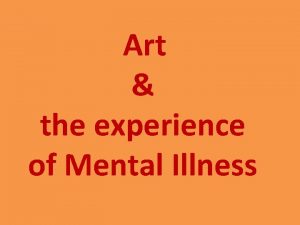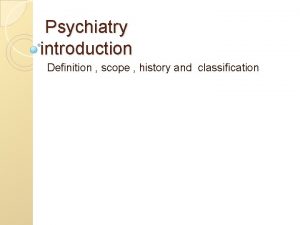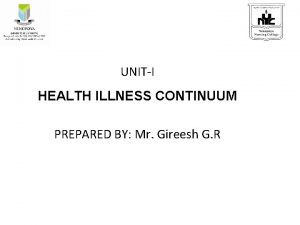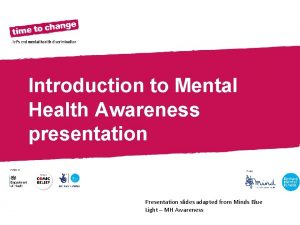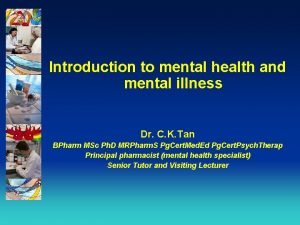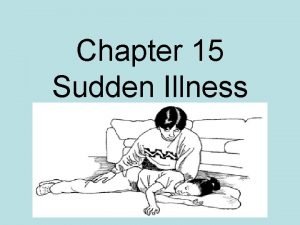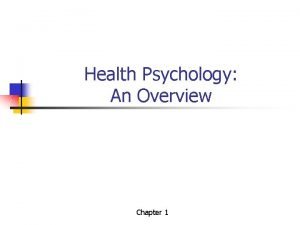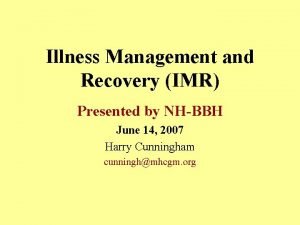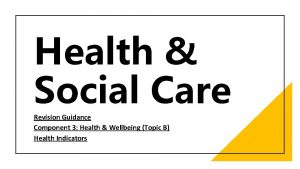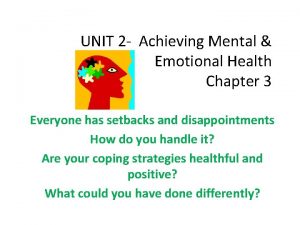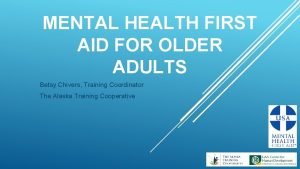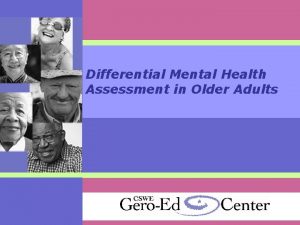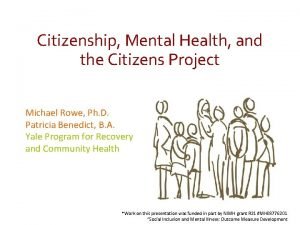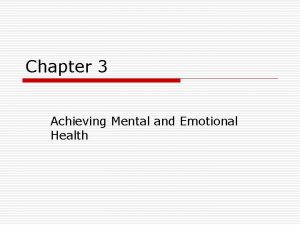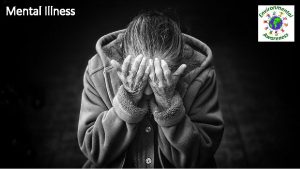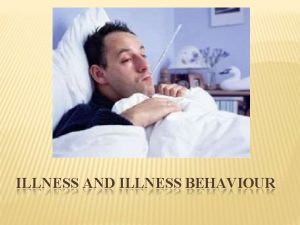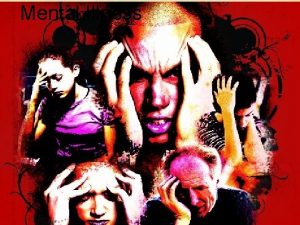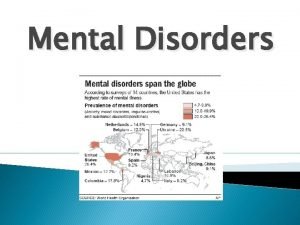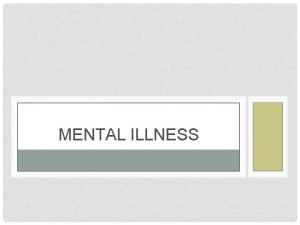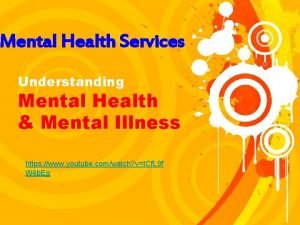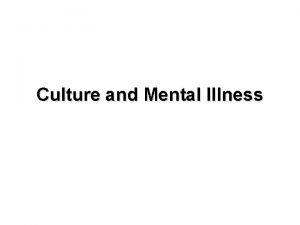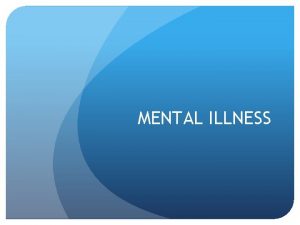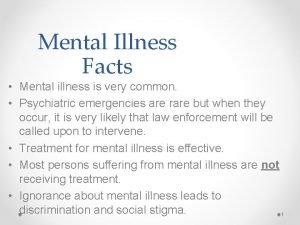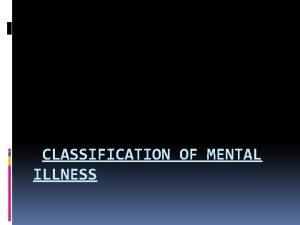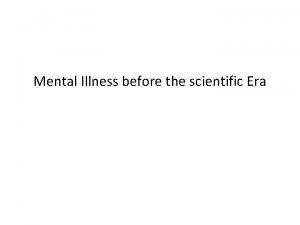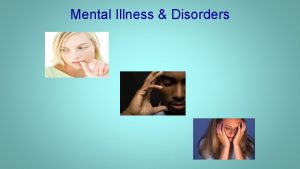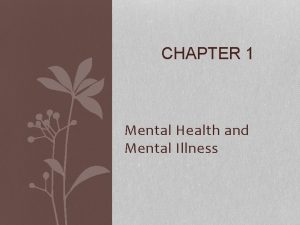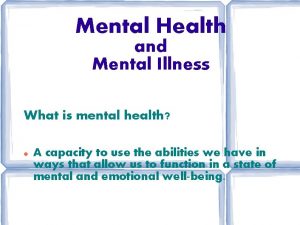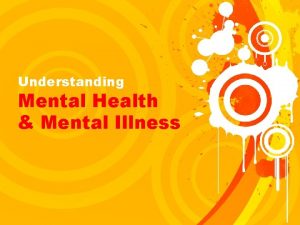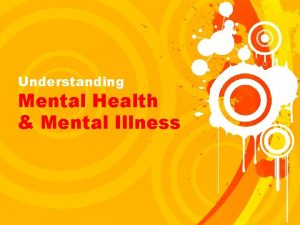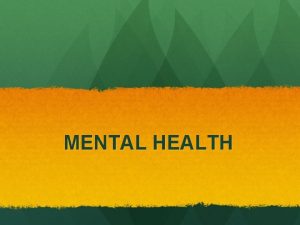Introduction to mental health and mental illness Dr

























- Slides: 25

Introduction to mental health and mental illness Dr. C. K. Tan BPharm MSc Ph. D MRPharm. S Pg. Cert. Med. Ed Pg. Cert. Psych. Therap Principal pharmacist (mental health specialist) Senior Tutor and Visiting Lecturer

Outline • • Definitions: ‘mental health’, ‘mental illness’ State of the UK’s mental health How are mental disorders diagnosed? Western concepts of mental illness

I. Definitions Mental disorders: ‘Abnormalities of behaviour or psychological experience with a recognisable onset after a period of normal functioning’. The so-called abnormalities: • Should not be a transient, predictable and expected response to an acute event • Should be of a certain level of severity, usually one that causes distress and disability Oxford textbook of Psychiatry

…. definitions Mental illness: A range of diagnosable mental disorders that excludes learning disability and personality disorder National Service Framework (NSF) for mental health (1999) Note: It is often difficult to diagnose specific mental health disorders as they are often complex and associated with co-morbidities such as substance misuse and other conditions (e. g. UTIs, dementias, Parkinson’s Disease).

…. definitions Mental health A state of well-being in which every individual realizes his or her own potential, can cope with the normal stresses of life, can work productively and fruitfully, and is able to make a contribution to her or his community World Health Organisation (updated August 2014) An individual’s ability to manage and cope with the stresses and challenges of life. National Service Framework (NSF) for mental health (1999)

…. definitions Good mental health is more than just the absence of a mental health problem; it is ‘having the ability to think, feel and act in a way that allows us to enjoy life and deal with the challenges it presents. ’ Terms such as mental hygiene and mental wellness are also used.

…. definitions What is normal? • No universally agreed boundary between normal behaviours and those described as mental illness; the boundary may be different between cultures, social groups and different social situations • Most mental health problems result from a complex interaction of biological, social and personal factors. Nevertheless, there is a common perception that psychiatric disorders are a sign of personal weakness and something to be ashamed of.

…. definitions • A diagnosis (or label), such as ‘schizophrenia’ or even ‘severe depression’, can carry a lifelong stigma for the patient and affect their relationship with themselves, their families and society as a whole.

State of the nation’s mental health Mental Health Foundation (2017) survey: • Small minority (13%) with high levels of good MH • > 4 in 10 experienced depression • Over a quarter experienced panic attacks • Nearly two-thirds experienced a MH problem • Highest reported MH problems: depression, panic attacks, seasonal affective disorder, ‘any other anxiety disorder’, phobias • Risk of mental ill health higher if you are female, a young adult, on low income, living alone or in a large household

…. state of the nation’s mental health • Survey every 7 years (England): no. of people with different types of MH problems. Last published in 2016 (Mc. Manus S et. al): Generalised anxiety disorder 5. 9 in 100 people Depression 3. 3 in 100 people Phobias 2. 4 in 100 people OCD 1. 3 in 100 people Panic disorder 0. 6 in 100 people Post traumatic stress disorder (PTSD) 4. 4 in 100 people Mixed anxiety and depression 7. 8 in 100 people

…. state of the nation’s mental health • Disorders measured over a lifetime Psychotic disorder 0. 7 in 100 people Bipolar disorder 2. 0 in 100 people Antisocial personality disorder 3. 3 in 100 people Borderline personality disorder 2. 4 in 100 people

…. state of the nation’s mental health • The number of people who have self-harmed, had suicidal thoughts or have made suicidal attempts over their lifetime Suicidal thought 20. 6 in 100 people Suicide attempts 6. 7 in 100 people Self-harm 7. 3 in 100 people

…. state of the nation’s mental health More modern well-known British personalities with mental health problems include: • J K Rowling, writer – depression • Russell Brand, comedian – bulimia • Frank Bruno, boxer – BPD • Victoria Pendleton, Olympic cyclist – self-harm to cope with fear of failure • Lady Gaga, singer – PTSD • Stephen Fry – BPD

How are mental disorders diagnosed? i. Mental State Examination (MSE) • “Snapshot" of person's psychological functioning at a given point in time, based on signs, symptoms & behaviour. • Used to elicit any psychopathological features: a series of structured examinations/questions which cover appearance, behaviour, speech, thoughts, mood, perception, cognition, memory & insight, e. g. : Appearance: unshaven, dishevelled, wearing pyjamas Behaviour: hostile, aggressive (verbal and non-verbal) Mood: appears low, but not expressing any suicidal tendency, elated mood

…. diagnosing mental disorders • Speech and language: not responding much, long intervals between sentences, incoherent • Thought process/form: not suicidal, no delusions or hallucinations, jump from one thought to another unconnected thought

…. diagnosing mental disorders ii. Classification systems • In medicine: symptoms clustered together to enable a specific diagnosis • Complemented by markers, e. g. blood glucose, ECG, EEG, blood pressure • In psychiatry, diagnosis made on: - signs & symptoms observed by others and/or self-reported - largely subjective & descriptive (e. g. thoughts, feelings, perceptions, behaviours, outward appearance)

…. diagnosing mental disorders Two main classification systems: • The International Statistical Classification of Diseases and Related Health Problems, ICD-10 online, 2016. (ICD-11 released June, 2018). Produced by WHO, widely used throughout Europe and the UK. Includes in Chapter V a detailed classification of over 300 mental and behavioural disorders. • The Diagnostic and Statistical Manual of the American Psychiatric Association (DSM V, 2013). Mainly in the US but used increasingly by NICE • DSM and ICD should be seen as complementary

…. diagnosing mental disorders iii. Rating scales in psychiatry • To ensure uniformity of diagnosis, & to monitor treatment, rating scales developed from a consensus amongst clinicians as to the importance of particular signs and symptoms. Examples: • Montreal Cognitive Assessment – used on President Trump to prove his mental stability • Depression Scale: PHQ-9 Depression, Beck’s Depression Inventory • Anxiety Scales: GAD-7 Anxiety, Beck’s Anxiety Inventory (BAI),

…. diagnosing mental disorders • Hospital Anxiety and Depression Scale (HADS) • Mini-Mental State Examination (MMSE) for rating cognitive impairment • Positive And Negative Syndrome Scale (PANSS) rating criteria - measuring symptom severity of patients with schizophrenia, and to monitor the effectiveness of antipsychotic therapy • Huge problem with consistency: inter-rater reliability, intra-rater reliability, fluctuating emotions in patients, other influences that bias outcome

Western concepts of mental illness The Organic theory • The Greeks thought that psychiatric disturbance was caused by, or at least accompanied by, physical changes within the body. In modern times, it is thought that many psychiatric illnesses are due to genetic defects, biological disorder, chemical deficits, or disordered neuro-transmission. These may, therefore, be remedied by pharmacological or surgical intervention. • Psychiatric patients should be regarded as having an illness, which should be treated in much the same as other illness. The hospital is a place where people go to be cured of their illness, much like any other illness or disease.

…. concepts of mental illness Demonic theory • Person is thought to have been taken over by a demon or demons which need to be cast out (or exorcised) by a more powerful supernatural authority • This often requires the services of a religious person or saint

…. concepts of mental illness Social theory • It is the environment (social and physical) in which people live that makes them ill • The environment in which they are treated, therefore, affects the outcome of the illness Theories relating to the unconscious mind • All sorts of theories relating to the extent which the unconscious mind is associated with mental illness, e. g. Freudian theories and psychoanalysis. Importance of past events in development of mental disorders.

Final thoughts • Value judgements are inherent in making a diagnosis. Could what was considered ‘abnormal’ yesterday become ‘normal’ tomorrow and viceversa? • Think of the conflict between church and state/society on sexuality issues. Homosexuality was once considered a mental disorder. Now it is those who cannot accept the new sexual dogmas who are considered to have mental health problems!

…. final thoughts • A diagnosable mental illness is decided by consensus, primarily by healthcare professionals and scientists who are largely atheists or agnostics. What implications does this have for the place of religious beliefs (in God, the afterlife, the Holy Spirit, miracles, prayer) in psychiatry? • In the communist era, belief in God was enough to get a person institutionalised for mental illness. On 13 February 2018, on ABC News, Vice-President Michael Pence, a committed Christian was accused on national television to be suffering from a mental disorder because he believed in God!

Bibliography • • • Branford D, Feetam CL (2011). Module 1: An Introduction to Psychiatry (13 th edition). Postgraduate Certificate in Psychiatric Therapeutics by Distance Learning. Birmingham: Aston University Department of Health (1999). National Service Framework (NSF) for mental health: modern standards and service models. London: Department of Health. Gelder M, Gath D, Mayou R, Cowen P (1996). Oxford Textbook of Psychiatry (3 rd edition). Oxford: OUP Mc. Manus S, Bebbington P, Jenkins R, Brugha T. (eds. ) (2016). Mental health and wellbeing in England: Adult psychiatric morbidity survey 2014. Leeds: NHS digital. The Mental Health Foundation (2017). Surviving or Thriving? The state of the UK’s mental health. London: The Mental Health Foundation.
 Chapter 20 mental health and mental illness
Chapter 20 mental health and mental illness Mental health jeopardy game
Mental health jeopardy game Historical views of mental illness psychology ocr
Historical views of mental illness psychology ocr Fair housing act mental illness
Fair housing act mental illness Mental illness in ancient times
Mental illness in ancient times Personality disorder vs mental illness
Personality disorder vs mental illness Mark rothko mental illness
Mark rothko mental illness Catherine earnshaw mental illness
Catherine earnshaw mental illness Americanization of mental illness
Americanization of mental illness Classification of mental illness
Classification of mental illness Ksi mental illness
Ksi mental illness Define health illness continuum
Define health illness continuum Illness and wellness continuum
Illness and wellness continuum Health illness continuum
Health illness continuum Titles for mental health presentations
Titles for mental health presentations Mental health introduction
Mental health introduction Signs and symptoms of sudden illness
Signs and symptoms of sudden illness Illness and wellness continuum
Illness and wellness continuum Nhbbh
Nhbbh Health and social care component 3 health and wellbeing
Health and social care component 3 health and wellbeing Chapter 3 achieving mental and emotional health answer key
Chapter 3 achieving mental and emotional health answer key Mental health and older adults
Mental health and older adults Law enforcement mental health and wellness act
Law enforcement mental health and wellness act Mental health and older adults
Mental health and older adults Mental health and citizenship
Mental health and citizenship Chapter 3 achieving mental and emotional health
Chapter 3 achieving mental and emotional health
